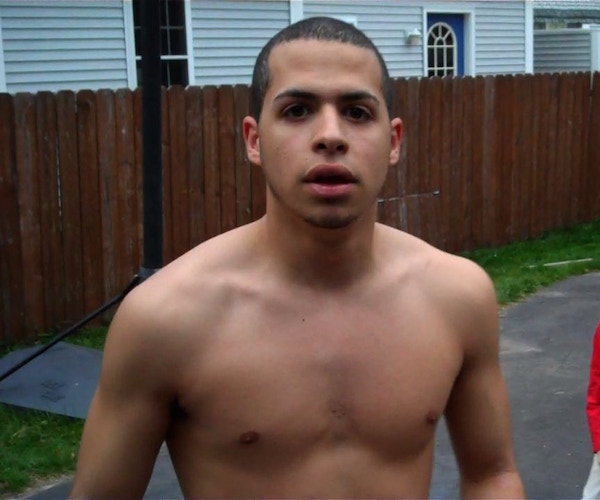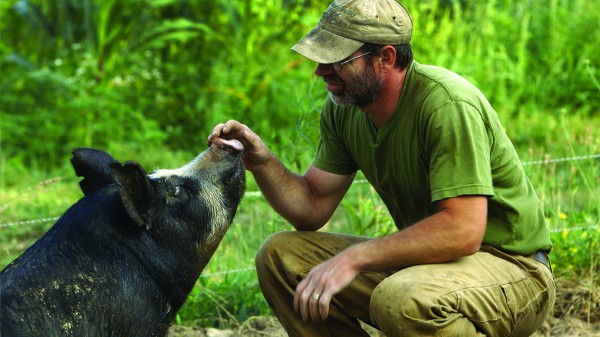Film Review: The Newburyport Documentary Film Festival — Cozy and Smart
The Newburyport Documentary Film Festival is leisurely and unpretentious — and addictive.

A scene from the moving documentary “Angelo Unwritten.”
By Gerald Peary
It’s leisurely and unpretentious, and it takes place over one long weekend each September. But I’ve become addicted to the cozy, smartly curated Newburyport Documentary Film Festival, this year Sept-15-17. Probably a dozen Boston-area non-fiction filmmakers also made the hour trip to spend a Saturday and a Sunday hanging out in lovely Newburyport and watching excellent documentaries.
The journey was well worth it just for Alice Stone’s deep, heart wrenching Angelo Unwritten. The filmmaker has devoted years to filming the up-and-down travails of a Puerto Rican foster child taken in by a WASPy, outdoorsy New Hampshire couple. Angelo, now past his teens, is intelligent, clever, a fine athlete, a talented rapper, a charmer, also angry, undisciplined, self-destructive, and seemingly wounded forever by his orphaned childhood. It’s perhaps a mismatch with his Caucasian family, but they do love him, they do try to set him on a righteous path. Terrific documentaries have great everyday heroes. In Angelo Unwritten, check out Brick, a rapper with the heart of an angel who becomes Angelo’s mentor and kind of substitute dad.
The Newburyport Fest managed a world premiere this year, Losing Our Religion, from Manitoba, Canada, co-directed by Leslea Mair and Leif Kaldor. This is the absorbing, previously untold story of religious clergy who, while still on the pulpit, have become non-believers. It’s invariably a devastating shock to their systems. Not only has their precious religiosity vanished but they can no longer function in their beloved professions. Unless they lie about no longer having faith. Some ministers do, and they are filmed in this documentary in the dark. They don’t dare show their faces, and their voices have been disguised so they won’t be caught. Other ministers have “come out” feeling shame, and have been rejected by their congregations, shunned by their friends, and marriages have eroded. The filmmakers demonstrate how similar the dynamic is to, in earlier times, people revealing their homosexuality.
Losing Our Religion is a film in which the clerical protagonists finally have found comfort in their declared atheism. It was paid for in part by grants from the Canadian state. Can you imagine the scandal in the USA for a godless documentary supported by government funding? My guess is that this film will have a dreadful time being shown anywhere on a PBS affiliate. We’ll see.
Birth of a Movement, co-directed by Bestor Cram and Susan Gray, offers the fascinating story of how William Trotter, an African-American journalist in Boston, helped launch a national protest against D.W. Griffith’s The Birth of a Nation at its 1915 release. As it was tailored for PBS’s Independent Lens, the film is engrossing but somewhat academic with so many educated talking heads. My real complaint is with the decision to alter the original 4:3 aspect ratio for the movie, instead spreading Birth full-screen. It’s essential to see Griffith’s film as actually framed to feel the disconnect between the masterly mise en scène and the pernicious racism of the narrative.
Daniel Mooney, the talented editor of Birth of a Movement, was also represented at Newburyport by a weird, arresting short, “Preparations for the Forest,” capturing the life of an outsider Maine artist whose odd works feature trout which he has caught and mounted via taxidermy. Other short films I enjoyed at Newport include Patrick Johnson’s “Honk: Festival of Activist Street Bands,” so darned engaging that it cries out to be expanded far past its 7 minutes, and Adam Roffman’s “The Collection,” a beautifully shot and conceived true story of a couple who stumbled at an antique store onto a fabulous collection of one-of-a-kind movie memorabilia. They purchased it for peanuts, and now they sit around trying to sell if for millions of dollars. So far, there are no buyers. Finally, I adored Oskar Peacock and Nemo Allen’s “Behind a Good Song.” It’s a valentine to the very much-deserving home-grown New England record label, Signature Sounds, which discovers and nurtures alternative singers and bands with a loving, personal touch.

A scene in the documentary “The Last Pig.”
One more documentary of merit at Newburyport: Allison Argo’s The Last Pig, the touching story of a gentle pig farmer who, after many years of raising pigs in the best free-range tradition, decided he could no longer in conscience send them to slaughter. He sold off his final pigs and now raises vegetables. “Well, are you changed in any way?” my wife, Amy, asked after the screening. No, I’m not giving up chops and spare ribs. Filmmaker Argo is probably hoping that her film will make you a vegetarian. In my case, it persuaded me more than ever to insist on organic meat.
Gerald Peary is a retired film studies professor at Suffolk University, Boston, curator of the Boston University Cinematheque, and the general editor of the “Conversations with Filmmakers” series from the University Press of Mississippi. A critic for the late Boston Phoenix, he is the author of nine books on cinema, writer-director of the documentaries For the Love of Movies: the Story of American Film Criticism and Archie’s Betty, and a featured actor in the 2013 independent narrative Computer Chess.
Tagged: Angelo Unwritten, Birth of a Movement, Losing Our Religion, Newburyport Documentary Film Festival, documentary
